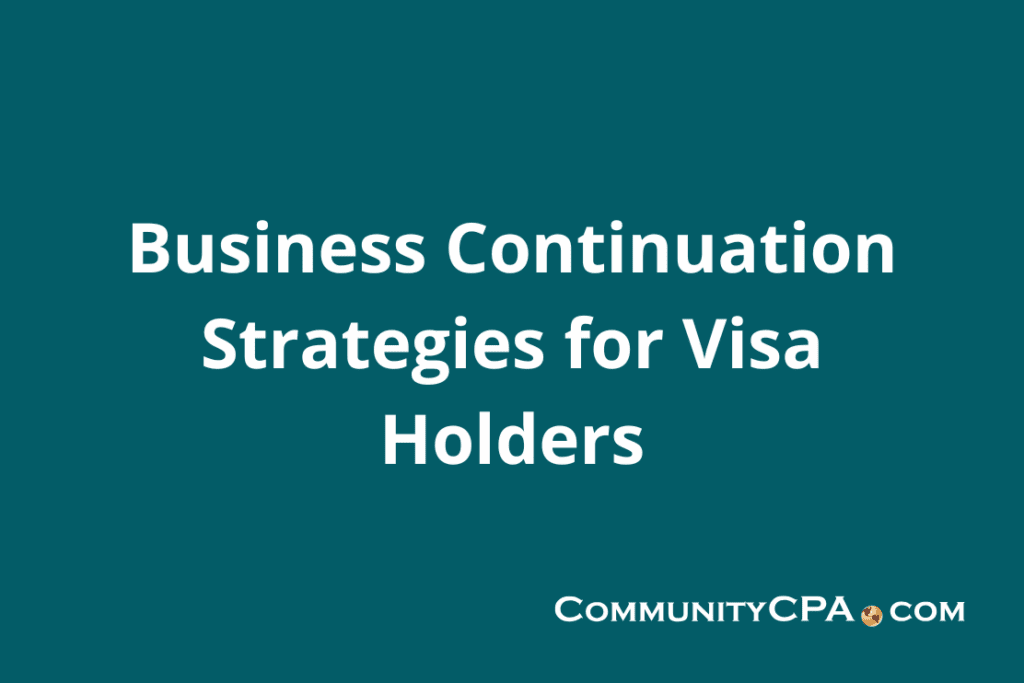Strategic planning to protect your business with temporary immigration status
For immigrant entrepreneurs holding temporary U.S. immigration status, the challenges of running a business are compounded by legal and financial uncertainties. Whether due to pending visa renewals, employment-based green card delays, or changing immigration policies, entrepreneurs in this situation must prepare their businesses and personal financial affairs with foresight and strategic discipline.
As a CPA firm dedicated to supporting diverse entrepreneurs, we want to guide you through the steps to fortify your business operations in the face of uncertainty. This article outlines how to structure your business, protect ownership, manage compensation, secure banking and licensing, and plan for tax compliance—all while preparing for potential economic and immigration-related disruptions.
Choosing the Right Business Structure: The C-Corporation Advantage
The legal structure of your business significantly impacts your ability to retain ownership, manage operations remotely, and comply with U.S. tax laws. If you’re a non-resident or anticipating a change in immigration status, converting your business into a C-Corporation (C-Corp) is the most pragmatic route. Here’s why:
- C-Corps can be owned by non-resident aliens, unlike S-Corps and most partnerships.
- Dividends distributed to non-resident shareholders are subject to U.S. withholding tax, but this can be planned for through proper tax strategy.
If you currently operate an LLC or S-Corp:
- Elect to be treated as a C-Corp if you are an LLC – This is done by filing Form 8832 with the IRS. It’s a tax classification change, not a legal entity change.
- Revoke your S-Corp status if you’re structured as an S-Corp to avoid disqualification based on residency status.
This structure allows you to maintain ownership and facilitates tax reporting continuity even if your immigration status changes.
Ownership: Safeguarding What You’ve Built
You founded the business—you should remain the owner. Structuring your ownership with longevity and contingencies in mind is key:
- As a non-resident, you can still own a C-Corp.
- If your children are U.S.-born or possess valid U.S. status, you can plan to transition ownership to them either temporarily or permanently. If your visa is revoked and you are no longer a U.S. tax resident, you may be able to gift ownership to a U.S.-based child without immediate gift tax liability, depending on the value and your lifetime exemption. Consult a tax advisor to structure this properly.
- For minor children, appoint a guardian (parent, sibling, or trusted relative) to manage the shares on their behalf. Legally, the children become the owners and the guardian handles day-to-day responsibilities.
- Alternatively, you can arrange a sale of the business or partial ownership before your departure if you anticipate a need to exit the U.S. on short notice.
Banking: Secure Access to Funds and Operations
Banking is often the most urgent and sensitive issue in scenarios where visa status changes suddenly. U.S. financial institutions have stringent identity and residency requirements, especially for adding authorized signers or opening new business accounts.
Here’s how to prepare:
- Add a trusted individual as a co-signer on the business bank account. This must usually be done in person, so prioritize this even if things feel stable for now.
- To enable remote banking access in your absence, transfer 20% of your company shares to a trusted U.S.-based individual. This allows them to open a new business bank account and continue operations. This share transfer can be executed remotely, unlike signer additions.
Choose this individual wisely. They will have significant financial access and influence, even if you retain majority ownership.
Separation of Ownership and Management
Many immigrant entrepreneurs act as both owner and operator. But in the face of potential absence, delegating operational control is a must:
- Define a management structure separate from ownership.
- Identify someone you trust to step in as the manager or CEO.
- Determine a compensation plan for this individual, and make sure they’re aware of what’s expected. This conversation should be conducted privately and well in advance.
Business licenses generally stay with the company (e.g., food permits), but others—like liquor licenses—may be tied to individual owners. Ensure your new structure is reflected in any license applications or renewals, especially if ownership percentages change.
Compensation: Pay Yourself the Right Way
Compensation depends heavily on your visa status. Here’s how to ensure you’re paid appropriately and legally:
- If your visa permits work in the U.S., your company can pay you W-2 wages.
- If your visa does not authorize work and you’re still in the U.S., you may only receive passive income such as 1099-DIV (dividends).
- If you’re outside the U.S., compensation should be paid to your country of residence. If you’re outside the U.S., your company may treat compensation as a foreign contractor payment, subject to IRS withholding rules and reporting via Form 1042-S. A W-8BEN form may be required. This is subject to applicable foreign withholding.
Tax Compliance: C-Corp Filings and Beyond
Converting to a C-Corp offers clarity in tax reporting. Here are the essentials:
- The C-Corp files its own tax return and pays corporate income tax directly.
- Payroll taxes, sales taxes, and property taxes must all be paid from the company’s bank account.
- Work closely with your CPA to manage filings and maintain compliance. Make sure they have access to all relevant documents, including accounting records, banking documentation, payroll platforms, and cloud storage for receipts and invoices.
By being proactive, you can ensure business as usual—even if you are no longer physically present in the U.S.
Final Thoughts
Temporary immigration status doesn’t have to spell instability for your business. With careful planning and the right partners, you can protect your legacy and navigate legal hurdles. Our CPA firm specializes in international tax compliance, immigration-sensitive business planning, and cross-border financial strategy. If you’re currently navigating the complexities of running a business on a temporary visa, schedule a confidential consultation with us today. Let’s build the future of your business together—secure, compliant, and resilient.

